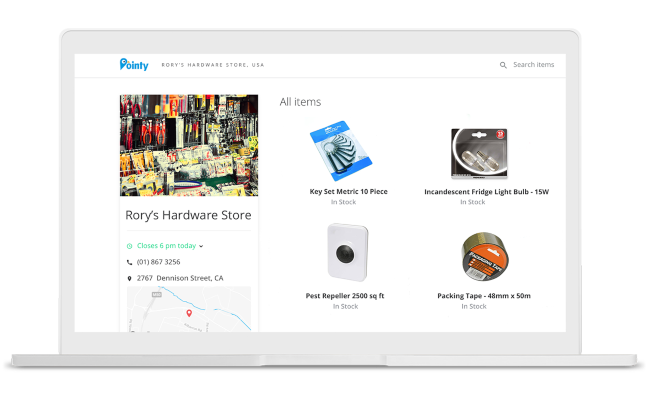Caroline Brady from Pointy explains the ingenious tech that brings bricks and mortar retailers into the digital realm.
Irish company Pointy was acquired by Google earlier last year for an undisclosed sum.
The company was established in Dublin by Mark Cummins and Charles Bibby in 2014.
“I think that if local retailers really want to meet the needs of their customers then making their in-store products visible online is a great first step”
Pointy is a small device that sits between a barcode scanner and a till and the retailer just scans as normal. The app directs shoppers to where particular items they are interested in are available locally.
The Covid-19 pandemic and various lockdowns led to Irish businesses embracing e-commerce and online shopping at an accelerated pace to stay engaged with the buying public.
An estimated 60pc of all online commerce conducted by Irish people leaves these shores direct into the coffers of global giants. Before Christmas there was a surge of support to buy Irish online out of a public recognition that shopping locally online saves businesses and jobs.
Over the coming weeks ThinkBusiness will focus a series of articles on the omnichannel future of retail including how to go online and sell as well as case studies of businesses that have adapted, including SMEs that have successfully received funding as part of the Government’s Online Voucher Scheme.
We spoke to Caroline Brady, head of Pointy Marketing at Google about how Irish businesses can ensure they are part of the digital commerce revolution.
What are your thoughts on the imperative to get more Irish firms trading online?
I think having an online presence for your business can definitely have a big impact. A retailer doesn’t necessarily need to set up a full e-commerce website in order to have an online presence for their store. There’s a lot of value in being able to show people the products you have available before they visit the physical store. We’re seeing more and more, especially during the pandemic, that people want to be able to go online and see where a product is available before leaving home. It’s not just about convenience anymore, there’s also a health consideration. I think that if local retailers really want to meet the needs of their customers then making their in-store products visible online is a great first step.

What are the most practical steps a business can take today to build a presence online but using your platform (Pointy)?
Pointy is a non-ecommerce solution that’s perfect for retailers who want to show their in-store products online and direct people to their physical store to purchase. The beauty of Pointy is that it requires very little maintenance on the part of the retailer. They connect a small device called a Pointy box in between their barcode scanner and till and continue scanning their products as normal.
As they scan products, Pointy pulls the correct name and image from the barcode number and adds it to the store’s own Pointy Page. This is essentially a website that we create and it shows an up to date list of the products they have in stock along with other information like opening hours and contact details.
The service was built with local retailers in mind – many of them might not have the resources or the time to set up and maintain a full e-commerce website. With Pointy they can start to build an online presence with very little work on their part and use it to drive more customers into their physical brick & mortar store.
How does the platform work and what are the best tips for making it perform?
In terms of making it perform, Pointy is really a plug and play solution. In most cases the retailer simply plugs in the box, continues scanning products as normal and gets on with the day to day running of their store. The Pointy box works silently in the background, adding products to the Pointy Page in real time as they are scanned. If a retailer wants to get more eyes on their Pointy Page they have the option to run our ProductAds feature. These are geo targeted text ads that can be set up in just two clicks. If a retailer already has a website with basic store information, they can update it to include a link out to their Pointy Page.
What are your thoughts on the future of retail in a world where online could become a preferred way for consumers to shop?
I think one of the most important factors for a lot of consumers when deciding where to purchase a product is convenience. They want to be able to pick up their smartphone, search for a product and see a list of different places where they can purchase it. Right now, the chances are that even if you do a local intent search for a product (e.g. where can i buy X near me) you’ll see a lot of results pointing you to the big e-commerce players and very few for local retailers.
The main reason for this gap in information is that most local retailers don’t have the products they carry listed online. So while they might be the most convenient option for the consumer, they’re often invisible online. Pointy aims to bridge the gap by providing local retailers with an easy way to display their in-store products online. Our aim is to make it as easy for a customer to find a product in a local store as it is to find it on an e-commerce site.
Video: How to get your business selling online
With Christmas 2020 now past, the year ahead 2021 still presents retailers with a challenge to go online to not only deal with closed premises if they are deemed non-essential but to address the expectations of an increasingly digitalised consumer.
To get the message out to SMEs, Bank of Ireland collaborated with online shopping platform Shopify as well as Pointy, the Irish platform recently acquired by Google that helps shoppers find via the internet the products they need in your physical store, and the E-commerce Association of Ireland (eCAI), to highlight the opportunities that exist online.
By John Kennedy (john.kennedy3@boi.com)
Published: 8 January 2021






